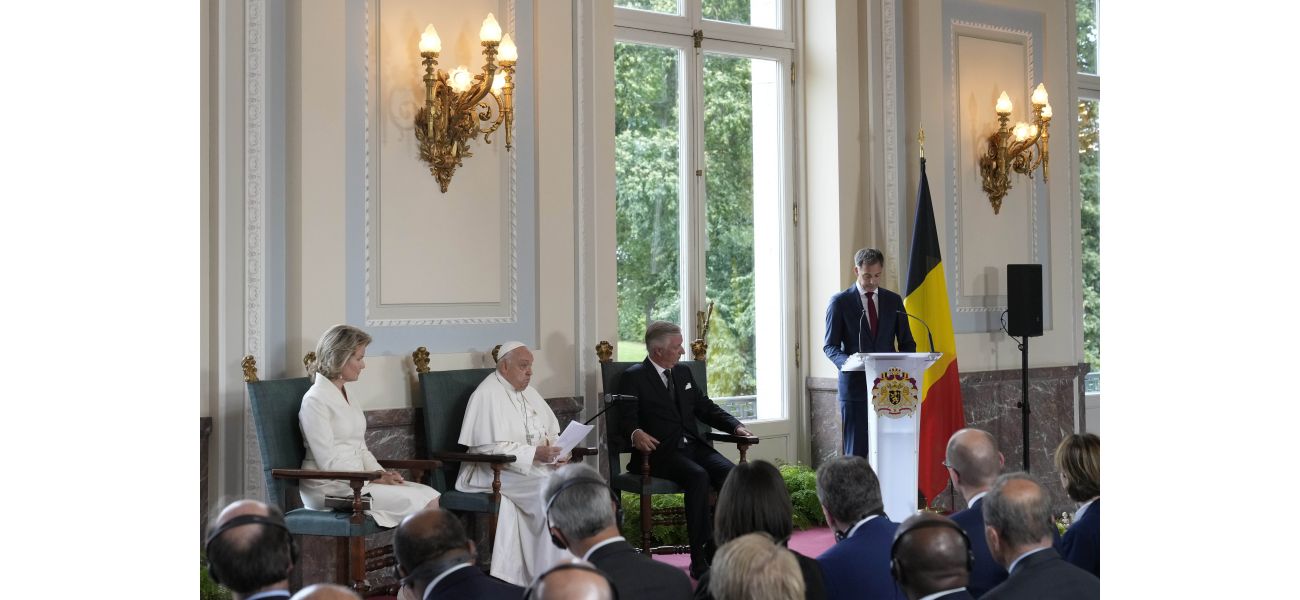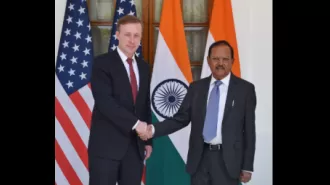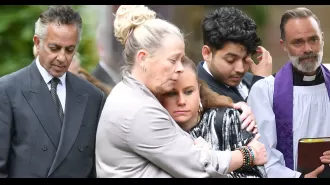Belgian leaders confront Pope Francis over church's handling of sexual abuse scandals.
Belgium's PM criticized Pope Francis directly for the Catholic Church's history of sexual abuse and cover-ups, calling for action to address the past.
September 27th 2024.

Belgium's prime minister, Alexander De Croo, did not hold back in expressing his disappointment and anger towards Pope Francis during the pontiff's visit to the country. In his passionate and powerful speech, De Croo addressed the horrific legacy of clerical sex abuse and cover-ups within the Catholic Church in Belgium. He demanded that the church take concrete steps to come clean about its past and prioritize the interests of the victims over those of the church.
This was not the first time that the Catholic Church's handling of abuse scandals had been brought to the forefront in Belgium. In fact, for the past two decades, there have been numerous revelations of abuse and cover-ups within the church, which have severely damaged the church's credibility and led to a decline in Catholicism in the country.
Even King Philippe had strong words for the pope, urging the church to work tirelessly to atone for its crimes and help the victims heal. It was clear that the abuse scandal was still a raw and sensitive topic in Belgium, as evidenced by the tone of De Croo's speech and the strong response it received from both the audience and the pope himself.
Despite the tense atmosphere, Francis applauded at the end of De Croo's speech and was expected to meet with victims in private later that day. In an impromptu response, he acknowledged the shame and humiliation that the church had brought upon itself and stressed the need for concrete actions to address the issue.
De Croo's words echoed the sentiments of the victims, who had long been advocating for their voices to be heard and their suffering to be recognized. Emmanuel Henckens, a survivor of abuse, welcomed the strong stance taken by both the prime minister and the king, stating that it was time to confront the evil that had been plaguing the church for far too long.
However, Koen Van Sumere, another abuse survivor, emphasized the importance of the church taking tangible steps to provide reparations for the victims. He called for a universal system of reparations to be established by the Vatican, a demand that the church has been reluctant to entertain as it prefers to handle financial settlements at a local level.
For Van Sumere, a simple apology is not enough. He stressed the need for the church to bear the consequences of its actions and compensate the victims for the damages they have suffered. He pointed out that the compensation provided by the Belgian church so far had been inadequate and did not cover the costs of therapy for survivors.
The abuse scandal in Belgium has been unfolding for over 25 years, with new revelations surfacing every now and then. One of the most shocking moments came in 2010 when Bishop Roger Vangheluwe, the longest-serving bishop in the country, was allowed to resign without facing any consequences after admitting to sexually abusing his nephew for 13 years. It was only earlier this year that Francis defrocked him, in a move that was seen as an attempt to appease the Belgian public before his visit.
The scandal reached a new level of notoriety when a Flemish documentary aired last year, featuring Belgian victims sharing their stories of abuse and the systematic cover-up by the Catholic hierarchy. This was a significant moment for the Flemish community, as it shed light on the extent of the scandal and the devastating impact it had on the lives of the victims.
Both King Philippe and De Croo delivered their speeches in Dutch, the language spoken in Flanders where the majority of the abuse cases had taken place. This was a deliberate move to address the issue directly with the affected community. De Croo's speech also deviated from typical Vatican protocol, as he was not only a politician but also a non-Catholic. However, his office had requested that he be given the opportunity to speak, similar to how Prime Minister Justin Trudeau had addressed the pope during his visit to Canada.
In his response, Francis acknowledged the gravity of the situation and stated that the church was taking firm and decisive action to address the issue. He mentioned implementing prevention programs, listening to victims, and accompanying them in their healing process. However, after the powerful speeches by De Croo and King Philippe, the pope went off-script and expressed the shame of the church for the scandal. He also vowed to work towards preventing such atrocities from happening again in the future.
For the victims, this was a step in the right direction, but they demanded more from the church. They called for a robust reparations program to be put in place to compensate them for their trauma and cover the costs of their therapy. Some even prepared a letter to deliver to the pope during their private meeting, urging him to take action.
The prime minister, king, and pope also addressed another scandal that had recently come to light in Belgium – the forced adoptions of children born to single mothers by the Catholic Church. This practice, which occurred after World War II until the 1980s, has caused immense pain and suffering for the victims, who have been unable to find their birth mothers due to the disappearance of records.
Francis expressed his sadness upon learning about these practices, but he also noted that they were a reflection of the societal norms at the time. He referred to a similar issue in Ireland, where he had issued a sweeping apology on behalf of the church during his visit in 2018. This was a topic that was close to his heart, given Argentina's own history of forced adoptions during the military dictatorship in the 1970s.
In the end, the pope reiterated the need for the church to ask for forgiveness and take responsibility for its actions. While this was a positive step, the victims and their advocates believe that the church must do more to address the issue and provide justice for the victims. Only then can true forgiveness and reconciliation be achieved.
This was not the first time that the Catholic Church's handling of abuse scandals had been brought to the forefront in Belgium. In fact, for the past two decades, there have been numerous revelations of abuse and cover-ups within the church, which have severely damaged the church's credibility and led to a decline in Catholicism in the country.
Even King Philippe had strong words for the pope, urging the church to work tirelessly to atone for its crimes and help the victims heal. It was clear that the abuse scandal was still a raw and sensitive topic in Belgium, as evidenced by the tone of De Croo's speech and the strong response it received from both the audience and the pope himself.
Despite the tense atmosphere, Francis applauded at the end of De Croo's speech and was expected to meet with victims in private later that day. In an impromptu response, he acknowledged the shame and humiliation that the church had brought upon itself and stressed the need for concrete actions to address the issue.
De Croo's words echoed the sentiments of the victims, who had long been advocating for their voices to be heard and their suffering to be recognized. Emmanuel Henckens, a survivor of abuse, welcomed the strong stance taken by both the prime minister and the king, stating that it was time to confront the evil that had been plaguing the church for far too long.
However, Koen Van Sumere, another abuse survivor, emphasized the importance of the church taking tangible steps to provide reparations for the victims. He called for a universal system of reparations to be established by the Vatican, a demand that the church has been reluctant to entertain as it prefers to handle financial settlements at a local level.
For Van Sumere, a simple apology is not enough. He stressed the need for the church to bear the consequences of its actions and compensate the victims for the damages they have suffered. He pointed out that the compensation provided by the Belgian church so far had been inadequate and did not cover the costs of therapy for survivors.
The abuse scandal in Belgium has been unfolding for over 25 years, with new revelations surfacing every now and then. One of the most shocking moments came in 2010 when Bishop Roger Vangheluwe, the longest-serving bishop in the country, was allowed to resign without facing any consequences after admitting to sexually abusing his nephew for 13 years. It was only earlier this year that Francis defrocked him, in a move that was seen as an attempt to appease the Belgian public before his visit.
The scandal reached a new level of notoriety when a Flemish documentary aired last year, featuring Belgian victims sharing their stories of abuse and the systematic cover-up by the Catholic hierarchy. This was a significant moment for the Flemish community, as it shed light on the extent of the scandal and the devastating impact it had on the lives of the victims.
Both King Philippe and De Croo delivered their speeches in Dutch, the language spoken in Flanders where the majority of the abuse cases had taken place. This was a deliberate move to address the issue directly with the affected community. De Croo's speech also deviated from typical Vatican protocol, as he was not only a politician but also a non-Catholic. However, his office had requested that he be given the opportunity to speak, similar to how Prime Minister Justin Trudeau had addressed the pope during his visit to Canada.
In his response, Francis acknowledged the gravity of the situation and stated that the church was taking firm and decisive action to address the issue. He mentioned implementing prevention programs, listening to victims, and accompanying them in their healing process. However, after the powerful speeches by De Croo and King Philippe, the pope went off-script and expressed the shame of the church for the scandal. He also vowed to work towards preventing such atrocities from happening again in the future.
For the victims, this was a step in the right direction, but they demanded more from the church. They called for a robust reparations program to be put in place to compensate them for their trauma and cover the costs of their therapy. Some even prepared a letter to deliver to the pope during their private meeting, urging him to take action.
The prime minister, king, and pope also addressed another scandal that had recently come to light in Belgium – the forced adoptions of children born to single mothers by the Catholic Church. This practice, which occurred after World War II until the 1980s, has caused immense pain and suffering for the victims, who have been unable to find their birth mothers due to the disappearance of records.
Francis expressed his sadness upon learning about these practices, but he also noted that they were a reflection of the societal norms at the time. He referred to a similar issue in Ireland, where he had issued a sweeping apology on behalf of the church during his visit in 2018. This was a topic that was close to his heart, given Argentina's own history of forced adoptions during the military dictatorship in the 1970s.
In the end, the pope reiterated the need for the church to ask for forgiveness and take responsibility for its actions. While this was a positive step, the victims and their advocates believe that the church must do more to address the issue and provide justice for the victims. Only then can true forgiveness and reconciliation be achieved.
[This article has been trending online recently and has been generated with AI. Your feed is customized.]
[Generative AI is experimental.]
0
0
Submit Comment





